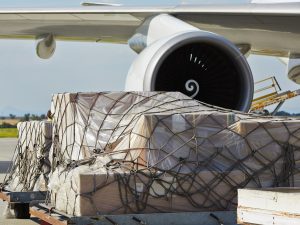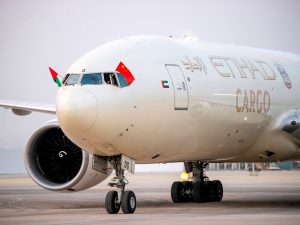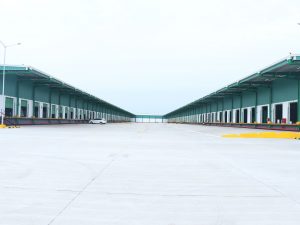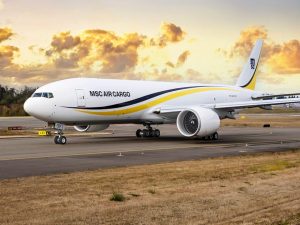Sanjiv Edward, CEO – Cargo, GMR Group highlights, “At Delhi International Airport, we conduct regular training and exercises to keep cargo personnel up to date regarding the latest measures on handling dangerous goods. DIAL follows all necessary safeguards rigorously which are important while handling such cargo including imparting dangerous goods training which is certified and valid at time of handling such goods. We ensure necessary infrastructure and processes all along the way to transport such goods – PPE for all staff handling dangerous goods, secluded area earmarked for handling, specialized transport vehicle, emergency response readiness and infrastructure thereof, environment friendly/green process of discharging any residue or remains of such product while handling of such goods. At Delhi Airport, we reiterate safety and regulations by displaying dangerous goods educative signage at prominent places at terminal and use technology, such as AI, to simulate handling and processing including past data & records of any accidents / prevention with help of data science. Delhi airport has allocated sufficient space to handle DG with specialized & certified manpower. We have invested in necessary infrastructure such as isolated locations, emergency response, chemical/smoke detectors and other timely detection infrastructure. Further, we ensure periodic certification from respective regulators to handle dangerous goods. Additionally, terminal operators at Delhi have global certification for warehouse operations such as ISOs, GDP among others. DIAL indulges in intermittent audits – Internal & external, which are conducted to ensure readiness for any eventuality, including drills/programs by government agencies which specializes in handling crisis situations. We continue to invest in people and processes for safe and secure handling of dangerous goods from our airports.”
Read More »‘Enhanced regulatory framework, tech integration, and collaboration vital to ensure safety’
C K Govil, President, The Air Cargo Agents Association of India (ACAAI) says, “Overall, while there are significant advancements in the handling and transportation of dangerous goods in India, ongoing efforts are needed to address the challenges related to infrastructure, compliance, and training. Enhanced regulatory frameworks, technological integration, and industry collaboration will be key drivers in ensuring the safe and efficient transport of hazardous materials in the Indian market. Handling and transporting dangerous goods in India require concrete efforts from the govt as well as the private players. I feel the adoption of technology in monitoring and managing the transportation of dangerous goods is increasing. GPS tracking, real-time monitoring, and digital documentation are becoming more common, enhancing safety and compliance. There is a continuous need for comprehensive training programs for all stakeholders involved in the logistics chain. Proper handling, emergency response, and safety protocols must be well understood and practiced. Many companies in India are adopting best practices and investing in training and infrastructure to ensure the safe handling and transportation of dangerous goods. Industry associations play a crucial role in disseminating information and best practices. Continuous updates to regulations and stricter enforcement are expected to improve safety standards. There is a growing focus on minimizing the environmental impact of transporting dangerous goods. Sustainable practices and the development of green logistics solutions will likely become more prominent.”
Read More »‘Rise in e-com, pharma, perishables, express cargo driving growth’
“India’s cargo industry holds immense potential and plays a crucial role in driving the country’s economic growth. Currently, we are witnessing robust growth driven by various factors such as the rise of e-commerce, the expansion of the pharmaceutical sector, increasing demand for perishable goods, and the growing need for express cargo services,” says Satyaki Raghunath, COO, BIAL. He adds, “The future will also be fueled by rising consumer demand, government initiatives promoting ease of doing business, and the implementation of advanced technologies for efficient logistics management. At BLR Cargo, our comprehensive range of cargo solutions is designed to meet the diverse needs of our customers. From state-of-the-art facilities and advanced cargo handling systems to customised services and efficient supply chain solutions, we strive to provide seamless and reliable cargo operations. Furthermore, India’s position as a global hub for pharmaceutical manufacturing and exports opens up immense possibilities for the cargo industry. We have also observed a steady rise in the export of perishable goods, including food products and flowers. Embracing digitalization, automation, last-mile delivery solutions, and sustainable practices are essential to staying competitive and meet evolving customer expectations. BLR Cargo has an estimated growth potential of 8.5-10% annually, aiming to reach 1.7-1.9 million metric tonnes (MTPA) by 2038.”
Read More »Amidst red sea crisis, Trans-Pacific air cargo market set for growth: Xeneta
According to the latest reports by Xeneta, with disruptions to ocean freight services in the Red Sea contributing to the growth in air cargo spot rates this year and the reliability of ocean freight container schedule remaining low, average ocean container spot rates from Northeast Asia to the US West Coast in the first week of May were more than double the level 12 months earlier. According to Xeneta, In March, ocean freight container schedule reliability for services from Asia to the US West Coast was just 49 per cent. Into the US East Coast, it was even worse at 38 per cent. As any improvements in ocean freight container service reliability will be slight at best in the coming months and rates remain elevated, it is not surprising some shippers have turned to air freight to protect their supply chains, the Norway-based ocean and air freight rate benchmarking and market analytics platform said on its website. There has also been significant movement in the cost difference between ocean container and air cargo services. For example, in the first week of May, the average air cargo spot rate on the Trans-Pacific trade was just under nine times more expensive than ocean container spot rates. Back at the start of December before escalation of conflict in the Red Sea, air cargo was around 22 times more expensive. After a temporary dip in March post-Lunar New Year, the eastbound corridor from Northeast Asia to the United States has seen spot rates rebound by more than 30 per cent year on year.
Read More »‘Capacity crunch, rising fuel prices, regulatory complexities key hurdles’
” Capacity constraints, fluctuating fuel prices, regulatory complexities, and geopolitical uncertainties are crucial areas of concern for the air cargo sector,” says Prithviraj Chug, CEO Group Concorde. “The lingering effects of the COVID-19 pandemic, such as supply chain disruptions and labour shortages, continue to impact operations and add to the industry’s challenges,” he adds. Additionally, he shares that rising competition from alternative modes of transportation and evolving customer expectations pose further challenges for industry players. Despite these obstacles, we view them as opportunities for innovation and collaboration. With strategic planning and proactive measures, we’re committed to overcoming these challenges and delivering value to our stakeholders.”
Read More »Etihad Cargo ready for PLACI to ensure seamless cargo operations
Etihad Cargo, the cargo and logistics arm of Etihad Airways, has announced its complete readiness for the UAE Pre-Loading Advance Cargo Information (PLACI) regulations, ensuring that partners and customers will experience no disruptions in their shipments. This achievement underscores the carrier’s commitment to maintaining the highest standards of security and efficiency in operations. PLACI is an advanced security measure designed to enhance the monitoring and safety of air cargo. It mandates the submission of cargo data to regulatory authorities for risk assessment prior to loading, thereby enhancing the security of the supply chain. This protocol is crucial for addressing potential threats early and supporting the seamless flow of commerce by ensuring that all cargo is risk-assessed before it is loaded onto an aircraft. Since its introduction, the adoption of PLACI has gradually expanded. Initially implemented by the US Customs & Border Protection with the Air Cargo Advance Screening (ACAS) programme in 2019, it was later adopted by the European Union with the launch of the Import Control System 2 (ICS2) in 2023. Both ACAS and ICS2 are fully integrated into Etihad Cargo’s operational processes, and Etihad Cargo was one of the first carriers to start live filing to ACAS. The UAE’s National Advance Information Centre (NAIC), under the Federal Authority for Identity, Citizenship, Customs & Port Security, is the first country outside of North America and Europe to implement a PLACI regime. Additional countries are planning to roll out PLACI, indicating a growing global commitment to bolstering the security of the air cargo supply chain against evolving threats.
Read More »Safexpress unveils 3.5 lakh sq.ft. warehouse in Chennai
Safexpress has unveiled its logistics park in Chennai, Tamil Nadu. As the largest logistics park in Tamil Nadu, this state-of-the-art facility is set to revolutionize the logistics industry, driving seamless trade operations and unlocking immense business potential in the region. Spanning across an expansive area of 3.5 lakh square feet, the logistics park offers unparalleled infrastructure and capabilities. Its key highlights include 130 feet wide U- Shape facility, strategically located on the Vanagaram – Ambattur Road. This prime location ensures convenient access and efficient transportation for businesses operating in and out of Tamil Nadu. Designed to withstand all weather conditions, the park features a 16 feet wide cantilever shed, guaranteeing 100% operational reliability. Additionally, an 80 feet concrete truck docking road has been constructed to facilitate smooth truck movement within the premises. With dedicated docking facilities for 75 trucks, the park ensures swift loading and unloading operations, streamlining logistics processes. As a gateway to South India, Chennai is among the most-visited Indian cities ranking 36th among the most-visited cities in the world in 2019. Chennai is a major centre for medical tourism and is termed “India’s health capital”. Chennai houses a major portion of India’s automobile industry and hence the name “Detroit of India”. It was the only South Asian city to be ranked among National Geographic’s “Top 10 food cities” in 2015 and ranked ninth on Lonely Planet’s best cosmopolitan cities of the world. In October 2017, Chennai was added to the UNESCO Creative Cities Network (UCCN) list. Safexpress, with its extensive network and comprehensive logistics solutions, is uniquely positioned to cater to the growing needs of businesses in Tamil Nadu and beyond. As the largest and strongest logistics …
Read More »MSC Air Cargo receives its fifth Boeing 777 freighter
MSC Air Cargo has taken delivery of its newest MSC-branded aircraft (I-MSCA), operated by AlisCargo Airlines, says MSC Air Cargo’s official Linkedin Page. “The state-of-the-art widebody freighter completes a fleet of five Boeing 777-200Fs, strengthening MSC Air Cargo’s position as a global expert in freight operations, committed to innovation and sustainability,” the post adds. Jannie Davel, Senior Vice President of MSC Air Cargo, said, “The aircraft will enhance efficiency and capabilities to better service our customers and trade lanes” in a LinkedIn post. With this newest freighter addition, the total number of Boeing 777 freighters in MSC’s fleet now amounts to five, as per MSC Air Cargo website. The freighter will be operated by MSC-owned AlisCargo Airlines.
Read More »CargoAi boosts digital performance with new CargoQUALITY
CargoAi’s CargoMART booking platform now offers up-to-date performance transparency alongside real-time price and capacity information. CargoQUALITY is a new feature that takes industry-established quality monitoring methods, applies a fair, common standard to all airlines, and provides CargoMART users with a clear performance overview as an additional booking consideration factor. In line with the CargoTech pledge to offer intelligent, easy-to-use, digital solutions for every air cargo business process, CargoAi’s latest online feature, CargoQUALITY, brings a unique, comprehensive overview to the international air cargo e-booking world. For the first time, freight forwarders using CargoMART are shown every airline’s quality performance on their selected flight route. All carriers are measured against the same industry-established method, namely their Notify for Delivery (NFD) performance. To ensure fair comparison, CargoAi applies a standard cut-off point of 6 hours. This quality overview offers an additional aspect alongside price, speed, and CO² emissions, and allows for a far more informed booking decision. CargoAi collaborates with around 100 airlines displaying their services on CargoMART, and has access to the data of the million of air waybills (AWBs) tracked during the last 12 months via CargoAi’s solutions. This enables CargoAi to calculate a Quality score per airline per route, reflecting the percentage of shipments that were ready to be delivered by the airline at 6 hours after flight arrival, according to a baseline roadmap derived from the booking information. The planned NFD (Notify for Delivery) is compared against the actual NFD milestone (or AWD, where necessary) to calculate the Quality score. The result flows into a historical CargoQUALITY score for the airline and route (origin and destination), as well as the historical CargoQUALITY score for all airlines on the route …
Read More »“Utilise full belly capacity to enhance EXIM trade’
“With a diverse geography and large population it is crucial that the available belly capacity is used effectively to enhance trade within and to and from India,” says Glyn Hughes, Director General, TIACA. “This is certainly the situation today with cargo benefitting from and supporting extensive passenger operations. However belly capacity alone will not provide the full capacity needed to achieve India’s economic growth targets. So freighter networks are crucial for connecting to global high volume cargo hubs as well as to provide much needed cargo capacity on developing passenger routes. Narrow body passenger aircraft such as the B737 or A321 may offer between 1 and 4 tonnes of cargo capacity on the lower deck, depending on aircraft version, flight route, passenger load factor and the nature of cargo. With 1 to 1.5 t being the norm. Mid-sized passenger aircraft such as the B757 may offer between 2 and 8 tonnes of cargo capacity on the lower deck, depending on aircraft version, flight route, passenger load factor and the nature of cargo. Wide bodied passenger aircraft such as the A330, A350, B777, B787 also vary depending on passenger load factors, wind direction, route, flight duration and type of cargo carried. But a A330 could be between 10 and 12 tonnes, an A350 could be around 17 tonnes but up to 25 tonnes in the -1000 variant, a B787 could be around 14 tonnes and a B777 between 20 and 25 tonnes depending on variant.“
Read More » Cargo Breaking News
Cargo Breaking News









